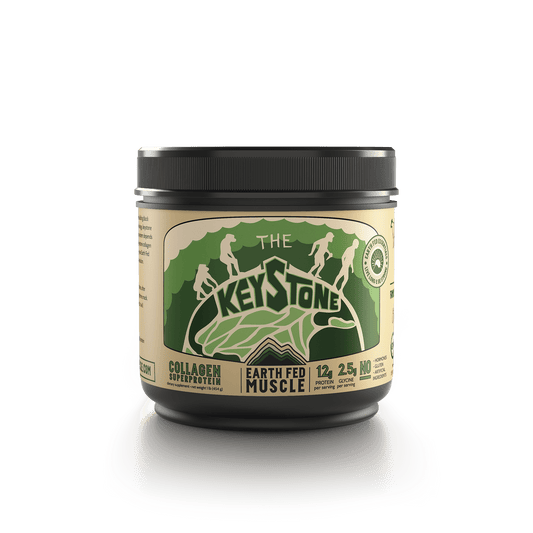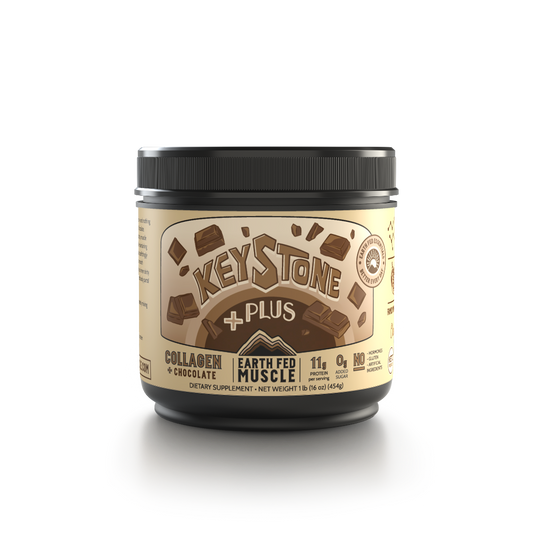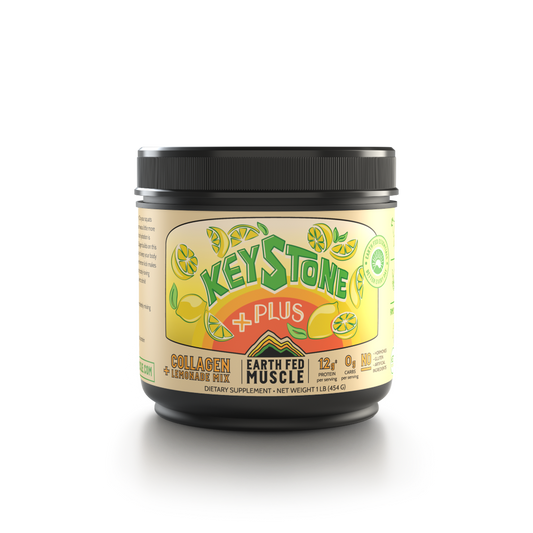As you probably know, collagen is a hot topic in the wellness and fitness world. But do you really understand all of the terminology associated with collagen? From boosters to hydrolyzed, it can all be a little confusing! This blog post will help break down some of the most common collagen boosting terms. Keep reading to learn more!
Collagen has become such a widely used supplement, for everything from sports performance to skin health. As with so many supplements, greater acceptance of collagen means more names, more variations, and more terminology. What used to just be called collagen can now be bought hydrolyzed, with only types 1 and 3 peptides, or with collagen “boosters” that claim to have all the same positive benefits. Here, we’ll try to demystify some of these terms, to help any discerning consumer better understand their collagen supplements.
The Keystone Collagen Superprotein
$39.99

So, What is Collagen?
First, the basics of collagen. While you may have heard of types I and III, there are actually 28 different types of collagen. Type I and type III collagen are simply the most predominant in the human body, but each of the many types plays a different role. Types I and III make up the majority of the extracellular matrix - or ECM-, which is the combination of fluids and fibers that surround our cells. The ECM helps support the structures in the body, as well as playing a role in cellular growth and maturation. Thankfully, there’s no need to supplement type I collagen over any other type. Like any protein that you ingest, collagen will be broken down into its constituent amino acids, which will then be used in your body to produce endogenous - think “homemade” - collagen. The big takeaway is: get enough collagen, no matter what type. This way, the body will have enough collagen amino acids to do what it needs.
Too Many Options
Peptides vs. Hydrolyzed
But, in today’s supplement market, marketing is rarely that straightforward. Collagen peptides are a popular type of collagen supplement, and for good reason. A peptide is defined as a short chain of amino acids, usually reduced from their full size through chemical reactions caused by enzymes. Another common collagen supplement is hydrolyzed collagen. Somewhat surprisingly, hydrolyzed collagen is basically the same as collagen peptides! Hydrolysis is the process of breaking down proteins. Hydrolyzed proteins and peptides are produced to increase their ability to be mixed into a solution (like your morning shake), as well as their digestibility. If you’ve ever tried to get your collagen intake from mixing gelatin into any liquid, you’ll understand why improved mixability is crucial. Thankfully, hydrolyzing a protein doesn’t change its amino acid profile at all. Collagen peptides will still include all of the glycine, proline, and hydroxyproline that a full collagen protein would boast. The improvements in digestion that come from hydrolysis increase the availability of these amino acids within the body. This means they’ll be able to contribute to skin and ligament health much faster.

Collagen Boosters
Collagen boosters are yet another supplement on the rise. Collagen boosters first appeared as an alternative to collagen for people with dietary restrictions. Basically all supplemental collagen is currently made from cows, fish, or pigs, leaving almost nothing in the way of vegetarian or vegan options. While there are ongoing preliminary efforts to produce vegan collagen, collagen boosters are currently a great collagen-related option for people who don’t consume animal products. While they don’t contain any real collagen, the aim of collagen boosters is plainly stated in the name: “booster”. They contain ingredients like hyaluronic acid and select vitamins, all designed to help your body produce its own collagen.
Keystone Plus Chocolate Collagen
$44.99

Hyaluronic acid is a polysaccharide, which is just a very complex sugar molecule. Hyaluronic acid is found in the fluid surrounding joints and tissues, and it plays an important role in the suppleness of your skin, joints, and vascular structures. Research has also found hyaluronic acid plays a role in collagen creation during wound healing. Other, more everyday ingredients in collagen boosters are vitamins like vitamin A and vitamin C. Research has shown that both vitamins support collagen in the body. Vitamin A has been shown to play a role in the creation of collagen and other proteins in the ECM. Similarly, research on vitamin C has suggested it can directly increase the production of certain types of collagen fibers. So, there is some scientific backing to the idea that collagen boosters can actually help your body produce more collagen. However, remember that boosting your own collagen production isn’t the full picture when it comes to supplementing collagen in your diet. The amino acids in collagen are involved in more processes than just skin and joint health. If you can’t supplement these amino acids directly from collagen, try to find alternative sources. For example, plant seeds like those from sesame and pumpkins can be rich sources of glycine.
Making Sense of It All
In spite of all of the marketing wizardry, the world of collagen is much simpler than it seems. Hydrolyzed collagen and collagen peptides are basically the same product; both are designed to make it easier to ingest and digest collagen. For the consumer, it all means more amino acids! Collagen boosters are relatively new, and can’t completely replace the benefits of supplementing collagen directly. However, there are some formulations that may be able to help your body maintain or even increase its own collagen production. In the end, the important goal is balancing your amino acid intake to have the well-rounded profile that your body needs to thrive. 
Keystone Plus Collagen Lemonade Mix
$44.99

Works Cited
- Ricard-Blum, S. “The Collagen Family.” Cold Spring Harbor Perspectives in Biology, vol. 3, no. 1, 15 Dec. 2010, pp. a004978–a004978, cshperspectives.cshlp.org/content/3/1/a004978.long, 10.1101/cshperspect.a004978.
- Nielsen, M.J., and M.A. Karsdal. “Type III Collagen.” Biochemistry of Collagens, Laminins and Elastin, 2016, pp. 21–30, www.sciencedirect.com/science/article/pii/B9780128098479000039, 10.1016/b978-0-12-809847-9.00003-9. Accessed 19 Nov. 2019.
- “Peptide | Learn Science at Scitable.” Www.nature.com, www.nature.com/scitable/definition/peptide-317/#:~:text=A%20peptide%20is%20a%20short%20chain%20of%20amino%20acids.&text=Peptides%20are%20generally%20considered%20to. Accessed 16 Jan. 2022.
- León-López, Arely, et al. “Hydrolyzed Collagen—Sources and Applications.” Molecules, vol. 24, no. 22, 7 Nov. 2019, p. 4031, 10.3390/molecules24224031.
- Zdzieblik, Denise, et al. “Improvement of Activity-Related Knee Joint Discomfort Following Supplementation of Specific Collagen Peptides.” Applied Physiology, Nutrition, and Metabolism, vol. 42, no. 6, June 2017, pp. 588–595, 10.1139/apnm-2016-0390.
- Paul, Cristiana, et al. “Significant Amounts of Functional Collagen Peptides Can Be Incorporated in the Diet While Maintaining Indispensable Amino Acid Balance.” Nutrients, vol. 11, no. 5, 15 May 2019, p. 1079, www.ncbi.nlm.nih.gov/pmc/articles/PMC6566836/pdf/nutrients-11-01079.pdf, 10.3390/nu11051079. Accessed 8 Dec. 2019.
- Abatangelo, G., et al. “Hyaluronic Acid: Redefining Its Role.” Cells, vol. 9, no. 7, 1 July 2020, p. 1743, www.mdpi.com/2073-4409/9/7/1743, 10.3390/cells9071743. Accessed 24 Nov. 2021.
- Mast, Bruce A., et al. “Hyaluronic Acid Modulates Proliferation, Collagen and Protein Synthesis of Cultured Fetal Fibroblasts.” Matrix, vol. 13, no. 6, Nov. 1993, pp. 441–446, 10.1016/s0934-8832(11)80110-1. Accessed 8 Dec. 2020.
- Wang, Frank, et al. “In Vivo Stimulation of de Novo Collagen Production Caused by Cross-Linked Hyaluronic Acid Dermal Filler Injections in Photodamaged Human Skin.” Archives of Dermatology, vol. 143, no. 2, 1 Feb. 2007, 10.1001/archderm.143.2.155. Accessed 13 Aug. 2019.
- Barber, Teresa, et al. “Vitamin a Deficiency and Alterations in the Extracellular Matrix.” Nutrients, vol. 6, no. 11, 10 Nov. 2014, pp. 4984–5017, www.ncbi.nlm.nih.gov/pmc/articles/PMC4245576/?fbclid=IwAR0Dvz5ix-EzX3FMeIGlul5YshQEOSCg9s6PIbRcSoCNZb8LsjwGFg-76I4, 10.3390/nu6114984. Accessed 30 May 2020.
- DePhillipo, Nicholas N., et al. “Efficacy of Vitamin c Supplementation on Collagen Synthesis and Oxidative Stress after Musculoskeletal Injuries: A Systematic Review.” Orthopaedic Journal of Sports Medicine, vol. 6, no. 10, Oct. 2018, p. 232596711880454, journals.sagepub.com/doi/10.1177/2325967118804544, 10.1177/2325967118804544.
- “Should I Be Taking a Glycine Supplement?” Verywell Health, www.verywellhealth.com/glycine-overview-4583816.
